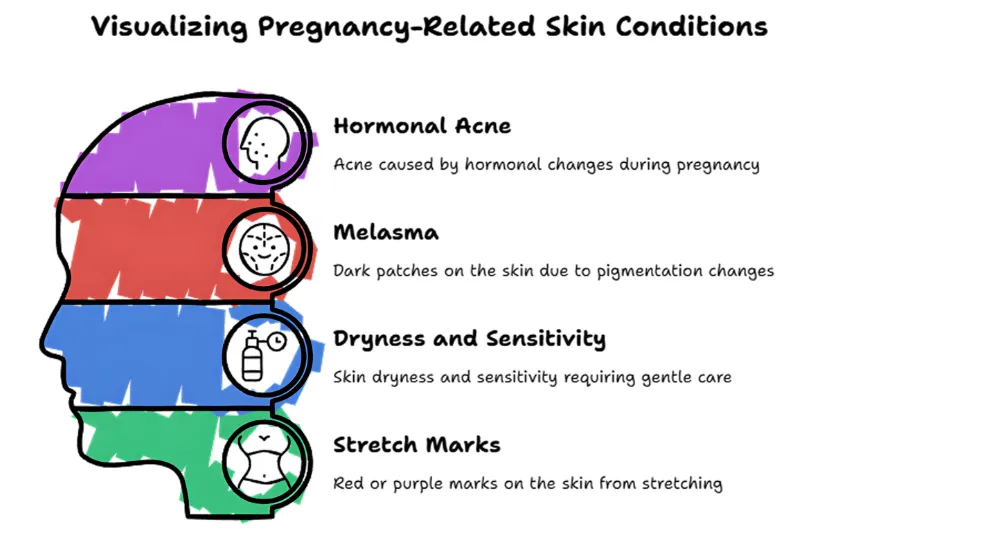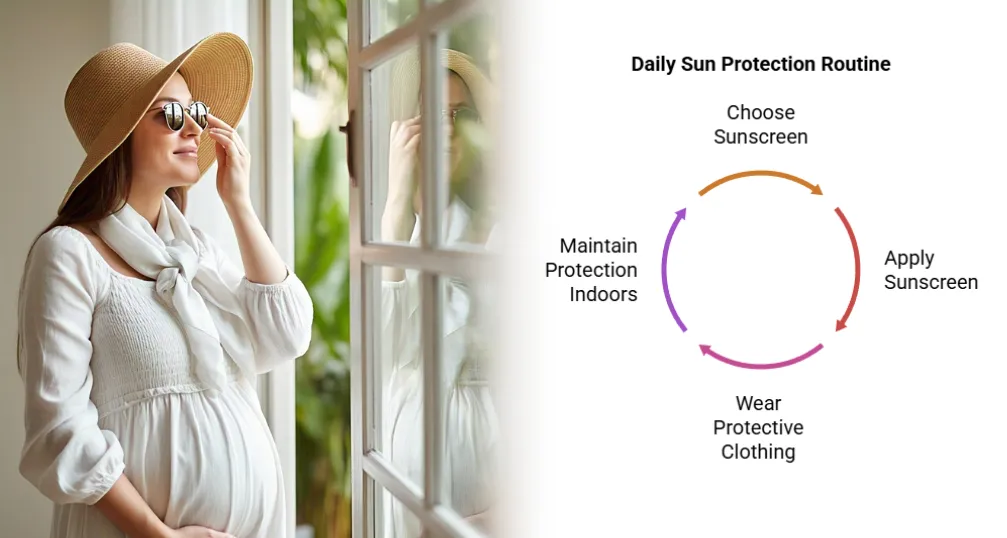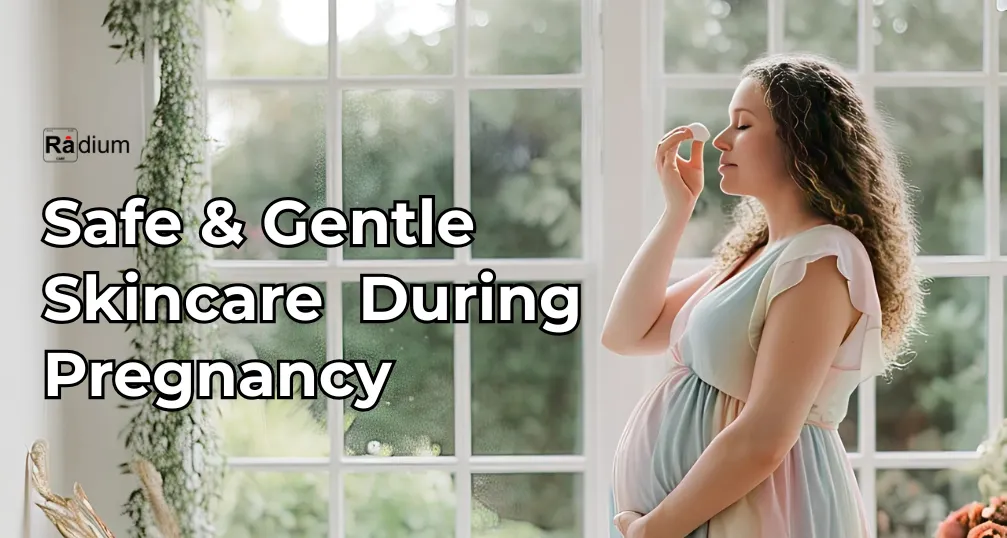Pregnancy is a lovely experience rich with excitement and anticipation. But as the body goes through many changes, so does the skin. Most women have changes in the texture of their skin, its hydration, and sensitivity because of hormonal changes. Some may enjoy the much-talked-about “pregnancy glow,” while others may find their skin affecting them negatively in terms of acne, pigmentation, dryness, or stretch marks.
Managing Pregnancy skincare during pregnancy demands special attention, as some ingredients in popular beauty products may be toxic to the unborn baby. The remedy is in accepting a gentle, wholesome, and safe routine which addresses these issues without being damaging. This tutorial explores the ideal ways of doing your skin a favor while expecting, including what ingredients are beneficial, common worries, and the ways in which Radium Care can help with safe skincare remedies.
Understanding Skin Changes During Pregnancy

Pregnancy results in an increase in hormones like estrogen and progesterone, which have varied effects on the skin. While some women naturally experience a pregnancy glow due to heightened blood flow and sebum secretion, others may face problems like hormonal acne, melasma, dryness, and stretch marks.
- Hormonal Acne: Pregnancy hormones can cause hormonal fluctuations, which in turn can cause excessive secretion of oil and spontaneous outbursts on women who have never had acne. The face, chest, and back are usually affected. Since some of the treatments for acne are unsafe during pregnancy, mild, non-comedogenic preparations have to be employed to control outbreaks.
- Melasma (Pregnancy Mask): Darkening of facial patches, particularly on the cheeks and forehead, is common among pregnant women. This is caused by excessive melanin production, which is again initiated by sun exposure. Applying broad-spectrum sunscreen on a daily basis and including vitamin C-based products helps minimize pigmentation and protects the skin.
- Dryness and Sensitivity: Hormonal changes can lead to water loss from the skin, making it feel tight, itchy, or irritated. Fragrance-free, highly moisturizing creams and serums with such ingredients as ceramides and hyaluronic acid can maintain skin moisture without causing discomfort.
- Stretch Marks: As the hips, breasts, and belly enlarge, the skin stretches and creates long-term red or purple markings after childbirth. Proper moisturizing of the skin with body oils and creams that stimulate collagen will cause elasticity, minimize itching, and provide fewer stretch marks with visibility.”.
Pregnant women concerned about these changes in their skin can select effective, safe, and pregnancy-friendly skincare products that nourish the health of their skin and overall health.
Cleansing and Hydration: The First Step to Healthy Skin
A gentle, scented-free cleanser is the best during pregnancy, as skin becomes more reactive and sensitive. Harsh cleaners can remove natural moisture, and the skin gets dry and irritable. A moisturizing face wash containing vitamin C or aloe vera will clean gently but maintain the skin fresh.
Hydration is also crucial, as the skin requires additional moisturizing to balance out dryness. Applying a moisturizer that contains hyaluronic acid, ceramides, or shea butter maintains elasticity and averts tightness. For oily skin, choose light, non-comedogenic products to prevent clogged pores.
Safe Skincare Ingredients for Pregnancy
Pregnancy calls for an awareness of what skincare products you should use, as some ingredients that are found in standard anti-aging and acne products can be dangerous to the unborn child. Retinoids, high dose of salicylic acid, hydroquinone, and chemical sunblocks are few of them which should be kept away. The safe and non-irritating variants impart healthy skin with no safety risk.
- Vitamin C: Very potent antioxidant, lightens skin, eliminates pigmentation, and protects from environment stress. An excellent hydroquinone alternative for treating melasma or dark spots.
- Niacinamide: A multi-functional product that soothes inflammation, regulates excessive oil secretion, and enhances overall skin texture. It is best for pregnant skin to treat pregnancy acne and redness without irritating the skin.
- Hyaluronic Acid: Extremely moisturizing product which makes the skin hold water, giving the skin a puffy and soft feeling. Since pregnancy dries up and makes the skin sensitive, using hyaluronic acid in the form of serums or moisturizers gives the skin constant hydration.
- Aloe Vera: The anti-inflammatory and soothing nature of aloe vera gives natural moisture, calms itchiness, and softens inflamed skin. Aloe vera is particularly beneficial in sunburn and sensitive skin conditions.
- Shea Butter & Cocoa Butter: Emollients rich in moisture tighten the elasticity of skin, relieve itchiness, and prevent stretch marks during belly expansion. Ongoing use softens and makes the skin supple.
Selecting skincare products with the healthy and hydrating ingredients ensures that pregnant women can take good care of their skin without putting them at risk of health-damaging toxic chemicals during pregnancy.
Sun Protection: A Must for Preventing Pigmentation

Pregnancy also enhances skin sensitivity to UV radiation, so melasma and dark spots may be exacerbated. A sunscreen with SPF 50 or higher broad-spectrum is required to prevent further pigmentation. For oily skin, apply a light non-greasy sunscreen and for sensitive skin, apply a moisturizing product.
In addition to sunscreen, clothing, hats, and sunglasses also provide extra protection from the sun. Sun care is important daily, even while indoors, as ultraviolet light can travel through windows and affect the skin.
Managing Pregnancy Acne Safely
Hormonal acne is a typical problem during pregnancy, but severe treatments such as benzoyl peroxide and retinoids need to be shunned. Instead, the natural and gentle route is ideal. Washing the face with a light cleanser, applying niacinamide serums, and putting on calming aloe vera reduces breakouts without irritating the skin.
For those suffering from excess oil production, once a week the application of a clay mask may assist in pulling out excess sebum and cleansing the skin. Patience is necessary, as pregnancy acne typically gets better following delivery.
Tackling Pigmentation and Uneven Skin Tone
The melasma or pregnancy mask is unlikely because of excessive melanin production and may be precipitated by sun exposure and hormonal changes. Although overall it tends to resolve after the pregnancy, it is managed in pregnancy on vitamin C serums, niacinamide products, and careful avoidance of sun.
Avoiding the sun and using hydrating and antioxidant skincare can flatten the complexion without resorting to strong brightening agents like hydroquinone.
Stretch Marks: Prevention and Care
Stretch marks are one of the most conspicuous changes to the skin during pregnancy, as the skin is rapidly stretched to accommodate the growing baby. While genetics are at play in their formation, nutrition and hydration can reduce their appearance.
Shea butter application and cream products that are saturated with shea butter, cocoa butter, and vitamin E help keep the skin elastic and reduce the severity of stretch marks. Ongoing massage and moisturizing also improve circulation, which allows the skin to adjust more smoothly to body changes.
Radium Care’s Pregnancy-Safe Skincare Solutions
Radium Care has a variety of effective and safe skincare products designed specifically for pregnancy. These safe products contain mild, natural elements to deal with most common issues such as dryness, pigmentation, and stretch marks without the use of any chemicals.
To stay hydrated and moisturized, Radium Care’s body creams and moisturizers made with hyaluronic acid, ceramides, and shea butter ensure your skin remains soft and pliable throughout pregnancy.
For complete sun protection, their SPF 50+ broad-spectrum sunscreens provide a non-greasy, weightless formula for sensitive skin without causing UV-induced pigmentation.
For hormonal acne and breakouts, their gentle vitamin C-infused facial cleanser and niacinamide serums soothe and reduce spots without irritating the skin.
It is part of it with Radium Care’s pregnancy-friendly skincare, so expectant mothers know that their skincare routine is safe, healthy, and effective and totally safe for them and the baby.
Postpartum Skincare: What to Expect
Following delivery, the body needs time to settle hormones, and a few women get postpartum acne, pigmentation, or dryness. Consistency with hydration, exfoliation, and sun protection will restore skin health.
As new moms hardly get time for complicated skincare regimens, multi-tasking products such as hydrating serums, sheer sunscreens, and moisturizing creams will offer maximum benefits for minimal effort.
Conclusion: Adopting a Safe and Effective Skincare Routine
Pregnancy skin care is just about providing protection and moisturizing and fixing problems like acne, pigmentation, and dryness. Pregnant women can have great, healthy-looking skin with gentle, moisturizing, and protective skin care without poisoning themselves and the baby using toxic chemicals.
For safe skincare during pregnancy, Radium Care provides moisturizing, doctor-recommended products designed to support evolving skin requirements. Hydration, sun shield, or pigmentation and stretch mark solutions – a balanced routine will ensure your skin stays healthy and radiant along this amazing ride.
Are you interested in trying the best skincare for your pregnancy? Learn about Radium Care’s lineup of safe and effective skin solutions today!
FAQ’s
What is safe face skincare during pregnancy?
During pregnancy, use calming and moisturizing skincare to keep the skin adequately hydrated and not dehydrated or irritated.
Can you use vitamin C on your face when you’re pregnant?
Yes, vitamin C is safe and can lighten the skin and eliminate pigmentation in pregnancy.
Is it possible to use sunscreen when pregnant?
Yes, it is safe and imperative to protect your skin from sun damage. Apply mineral-based sunscreens and avoid chemical ingredients.
How to prevent stretch marks during pregnancy?
Drink lots of water, eat skin-friendly food, and exercise regularly to make your skin flexible and improve circulation.
